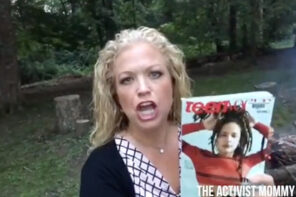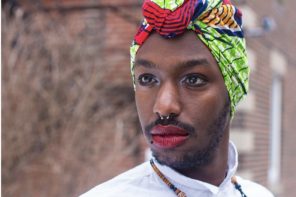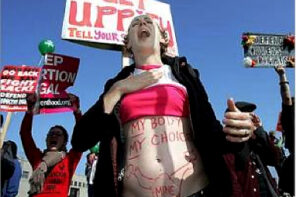This week, the National Center for Health Statistics announced that after a 14-year steady decline in teen birth rates, the US has experienced a sharp rise in the birth rate among 15- to 19-year-olds. From 1991 to 2005, the rate plummeted 34%; between 2005 and 2006 it rose 3%. The increase was greatest among black teens. Their birth rate rose 5%.
Of course advocates and experts on both sides of the sexual and reproductive rights divide claimed that the other side was responsible. Abstinence-only sexuality education leaders claimed it proved the prevention message focusing on using contraceptives was the cause, while the comprehensive sex education crowd blamed abstinence-only. While we have ample evidence that abstinence-only education has been ineffective in reducing adolescent sexual activity, experts are uncertain of the reasons for the sharp shift in teen births. They note that birth rates are also rising among other age groups as well. And the Center for Disease control recently reported that the long decline in teenage sexual activity is at a standstill. It is still true that US teen pregnancy, abortion and birth rates are substantially higher than those of other developed countries, and that teen mothers in the US are far more likely not to finish high school and to live in poverty.
What role, if any, can progressive religion play in addressing this problem? The question takes on particular significance politically as one of the principal goals of the White House Office on Faith Based and Neighborhood Partnerships will be to “address teen pregnancy.”
Unfortunately, at present, only a minority of the members appointed to this counsel have any expertise on the topic and the faith based members are far more philosophically attuned to abstinence-only sexuality education and most are on record declaring that sexual activity is only licit in marriage. One or two members have gone so far as to accept that sexuality might be licit in other forms of “covenanted relations.” This, for example, was the position taken by Jim Wallis in one conversation we had, but when I asked him to define what constituted a covenanted relationship, he demurred.
I also remembered a lunch conversation I had with clergy in a small rural community in New York where I asked whether or not they talked about sexuality from the pulpit. One said he had tried it, but the congregation told him they didn’t like it. The fact is that our mainstream faith groups, for the most part, are more open in accepting a woman’s right to choose abortion than they are in accepting an unmarried person’s right to have sex. We deal with adolescent sexuality by saying “Of course, adolescents should refrain from sex until they are married, but since we know a significant number of them won’t follow this advice, we should teach them how to prevent pregnancy.” This is not a “Catholic” thing. It is a Methodist, Lutheran, Jewish, etc thing.
It’s also a secular thing, with even good quality comprehensive sexuality education programs offering inadequate time to working on relationships and values, opting for fear-based advice about getting pregnant and contracting STI’s as the basis for not having sex. A promising program that goes the relationship route is featured today on Time.com. Amy Sullivan reports on a five year old sex ed and relationship program in Anderson County South Carolina where teens get three solid years of sexuality education—and lots of support for figuring out what kind of life they want to have. The article’s poster child 16-year-old Jewel Morris Davis says: “I am the first person in my family to reach 16 without getting pregnant—or getting someone pregnant.”
Some in the religious community who preach abstinence is best for teens as well as chastity for all before marriage could learn something from this approach. But, progressive religion has even more to offer. It holds far more nuanced positions on what makes sex good, healthy and holy—and a marriage license is not the gold standard for adults. There is a lot of sex within marriage that is problematic—violence, coercion, a lack of love come to mind. There is also a lot that is filled with caring, affection and part of growing in grace together. But it is not a marriage license that makes it so. My beliefs about this are based on anecdotes and statistics. I write as a never married dominantly heterosexual women who since age twenty has had positive long term sexual relationships as well as meaningful and occasionally unimportant sexual encounters. Treating myself and my partners honestly and justly has always seemed to me to be what God expected.
Many progressive theologians have put forth other standards for assessing the holiness of sexual relationships. Why, they ask, do we apply a contract model to one of the most profound types of human relationships—sex—when we use a justice model to evaluate every other relationship: parent and child, friends, employers and employees, citizen and state. If we cannot as a faith community really address the question of sexuality for adults and go beyond the marriage myth how will address adolescent sexuality?
Adolescence covers years of rapid growth and change in capacity as young people move toward adulthood. A 13-year-old and a 17-year-old have dramatically different capacity for understanding spirituality, intimacy and relationship. A just say no to sex approach does not contribute to the development of those capacities. In 2003, 33% of ninth graders (on average 14 years old) had had sexual intercourse by 12th grade, the percentage rose to 62%. Among teens 15-17 who have had sexual intercourse, only 6 in 10 had ever seen a health care provider about their sexual health. I cannot help but wonder how many had seen a religious counselor about their sexual health, although I suspect the percentage is much lower.
This brings me back to my concern about how the White House office on FBNP is going to approach this issue and whether or not they will be helpful. The natural inclination of religious leaders to avoid asking hard questions about what God wants of us humans in our sexual relationships is combined with the reluctance of government leaders to touch the issue of sexuality. The notion that state-sponsored religion—which is what the White House office represents (non-sectarian, but state sponsored)—is going to blaze new theological trails is remote. Teens are likely to be approached once again in a utilitarian way—prevent sexually transmitted diseases, avoid emotional trauma of youthful relationships and don’t get pregnant.
Who in the religious community is going to talk with them about the big questions? What is the spiritual meaning of sex and relationships? Can adolescent sexuality be mature, loving and respectful? Are short term, non-covenanted, relationships just and valuable? These questions and many others are being discussed in the scholarly community, but they need to be discussed with teens who are making decisions about relationships every day.
Perhaps the most significant obstacle to this conversation with teens is our reluctance as leaders in faith communities to talk about our own sex lives. We talk about our political history, the marches we went on, what we think about ethics and money, work, occasionally we even talk about what we believe about the narratives that form the basis for our religious belief. We say that we know that personal stories, testimony is one of the best ways to explore what we believe. But when it comes to sex, keep it in the closet. GLBT faith leaders are somewhat more open, but more often that is limited to superficial details about a present relationship or acknowledgement of a shift in sexual expression (I once was in a heterosexual marriage, but now I am with a same sex partner).
Would adolescents develop more mature, justice-seeking relationships if they knew something about the personal sexual history and values of their parents or pastors? And if the hairs on the back of your neck just stood up, I’d love to know why. If sex is so important, why don’t we want to talk about it. The Time.com piece described an exercise where teens shout out over and over again “penis” and “vagina” because until teens can use the words without giggling they can’t really talk or think about sexual ethics. How often have you used those words and others in lectures, sermons and church coffee hours? Treating sexual relationships and sexual intimacy in the same open and probing way we treat other aspects of justice is really tough. Why is it so much easier to share with the community other challenges we’ve faced but out of the question to talk about the first time we had sex; if we were virgins when we married; what kind of sex life we lead if we are not married and how we came to hold whatever standard of sexual intimacy we hold.
I find it hard to believe that we can ever really “address adolescent sexuality or pregnancy” if we can’t address our own sexuality. I’ve long held that sexuality education for adults is probably more pressing than for teens. Now, who is going to do it?




